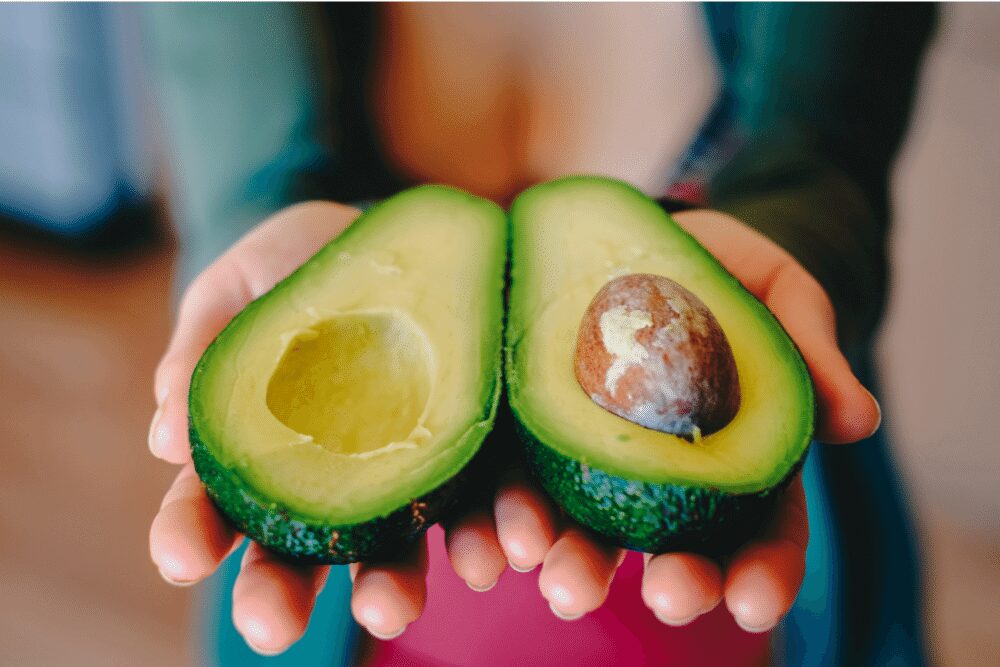Is Avocado A Fruit Or Vegetable?
A popular question we get is- “are avocados a fruit or vegetable”?
An avocado is a type of fruit. It is green and has a smooth skin. Inside the avocado is a pit, which is the seed of the fruit.
The avocado tastes creamy and delicious!
Some people think avocado is a vegetable because it’s green and has a mild flavor.
However, avocado is technically a fruit (a berry, more specifically) because it contains seeds.
Avocados are not only delicious, but they also contain essential nutrients that our bodies need.
For example, avocados are a good source of dietary fiber, vitamin C, vitamin E, and potassium.
Here Are The Nutrients Found In Avocado

Dietary fiber – good for you because it helps keep you regular, and it can also lower your cholesterol levels and blood sugar.
Additionally, dietary fiber can help you feel full after eating, which can help with weight loss.
Vitamin C – good for you because it helps your body fight off infection, and it also plays a role in collagen synthesis.
Collagen is a protein that helps keep your skin looking young and healthy. Additionally, collagen can help strengthen your bones and joints.
Vitamin E – good for you because it helps protect your cells from damage. Additionally, vitamin E can help improve your circulation and lower your risk of heart disease.
Potassium – good for you because it helps keep your body’s fluid balance stable. It also helps keep your heart healthy and can reduce the risk of stroke.
Additionally, potassium can help regulate blood sugar levels and can reduce the risk of developing type 2 diabetes.
Type Of Fats In Avocado And Why They’re Healthy
Monounsaturated fatty acids are the type of fat found in avocados. They are a healthy type of fat because they can help reduce the risk of heart disease.
Monounsaturated fatty acids can help lower your cholesterol levels and blood sugar levels, and they can also reduce the risk of developing type 2 diabetes.
Additionally, monounsaturated fatty acids can help improve your circulation.
Flavor Of Avocado
The flavor of avocado is unique. It’s a little bit sweet, but it also has a slightly nutty taste. Additionally, avocados are a little bit creamy, which makes them perfect for spreading on toast or adding to smoothies.
Avocados are also really versatile and can be used in a variety of recipes. For example, you can add them to salads, soups, or tacos.
Some Of The Most Popular Uses For Avocado
- Adding them to salads, such as chicken salad, tuna salad, or taco salad.
- Adding them to sandwiches in place of mayonnaise. For example, you could add avocado slices to a turkey sandwich or chicken salad sandwich instead of mayo.
- Guacamole is also one of the most popular uses for avocados because it tastes great with just about anything.
- Using them in smoothies. Adding a small amount of avocado to your smoothie can create a thicker texture and give it a richer flavor.
- Adding them to soups or stews. For example, you could add avocado slices to chicken tortilla soup for an extra burst of flavor and creaminess.
Can You Eat An Avocado Every Day?
Yes, you can eat avocado every day! Avocados are a healthy food and they contain a variety of essential nutrients that our bodies need.
Additionally, avocados are a good source of monounsaturated fatty acids, which are a healthy type of fat.
One thing to watch out for is the calorie content. If you’re trying to lose weight, you’ll want to keep an eye on your total calorie allotment for the day, and make the necessary adjustments.
Flavorful and versatile, avocados can be added to salads, sandwiches, smoothies, and more. So next time you’re at the grocery store, don’t forget to pick up an avocado or two!
